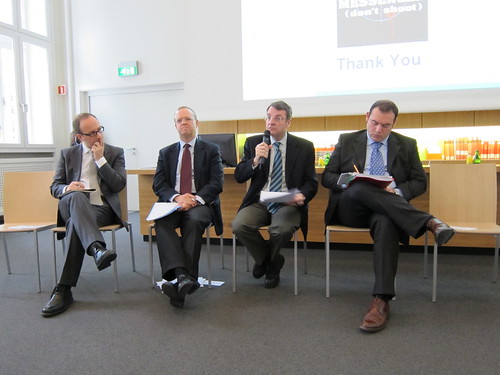
We recently attended a workshop in Luxembourg as part of Communia, the EU policy network on the digital public domain. There was a focus on bringing together themes from previous events to make a series of policy recommendations to the European Commission (watch this space!).
Below are a few notes highlighting some of the talks and discussions that we thought might be of particular interest to readers here:
- We had a meeting to review where we are up to with the Public Domain Calculators. So far it looks like we have 10 EU countries covered, 8 maybe covered and 6 that we are still looking for help with (namely: Cyprus, Denmark, Lithuania, Luxembourg, Slovakia, Slovenia). If you’d like to help out – please drop us a line!
- Jill Cousins from the European Digital Library Foundation spoke about the latest state of play with respect to licensing the content of Europeana, a collection of over 6 million images, texts, sound recordings and videos. In particular she spoke about the possibility of libraries and cultural heritage organisations releasing digital content into the public domain or under an open license. There has been some opposition – but we very much hope that institutions contributing to Europeana have the foresight to give this serious consideration!
- Paul Keller and Lucie Guibault presented their work on the recently released public domain manifesto – discussing the rationale behind it, its genesis and various versions, and an overview of its main principles and recommendations. At the time of writing it has been signed by over 50 organisations and 1800 individuals.
- Francesco Fusaro of the European Commission DG Research spoke about the EU initiatives to support open access to scientific publications and data – from background research in this area to piloting open access to approximately 20% of FP7 funded projects.
- Patrick Peiffer gave an excellent presentation on licensing options for bibliographic metadata. In particular he suggested that non-commercial restrictions could cause substantial transaction costs and technical complications. On the other hand using an ‘attribution, sharealike’ type license that allowed commercial reuse which would cause no transaction costs, create a level playing field, allow interoperability with projects like Wikimedia and Wikimedia Commons, avoid exclusive deals and open up new channels of discovery. It would be a big step if Europeana libraries and institutions follow the lead of CERN Library, who last week announced that they were opening up their metadata!
- Mathias Schindler spoke about tools developed by the Wikipedians using open bibliographic metadata. He also described what the Wikipedia community had done to add value to collections of cultural works – such as improving the quality of metadata, adding descriptions to images and so on.
- Rufus Pollock spoke about his work at the University of Cambridge to estimate the size and value of the public domain in Europe.
See also:

Dr. Jonathan Gray is Lecturer in Critical Infrastructure Studies at the Department of Digital Humanities, King’s College London, where he is currently writing a book on data worlds. He is also Cofounder of the Public Data Lab; and Research Associate at the Digital Methods Initiative (University of Amsterdam) and the médialab (Sciences Po, Paris). More about his work can be found at jonathangray.org and he tweets at @jwyg.









Library o Europeana, que en un reciente Workshop en Luxemburgo
makes sense look at the Open Knowledge Blog
Congratulation! great job, it is very nice to hear that different countries has unite in one common goal sharing and openness. thanks for sharing this informative article.
thanks for sharing…………
I agree that Wikipedia is really a good tool to add value to collections of cultural works
thanks for sharing…………
Quảng cáo Chicilon Media
Library o Europeana, que en un reciente Workshop en Luxemburgo
sms chúc thi tốttruyện haygame vườn hoàng cung
cong ty bao ve , Công ty bảo vệ An Ninh Toàn Cầu,
dich vu bao ve , dịch vụ bảo vệ chuyên nghiệp tại TP.HCM
Liên hệ :
Số63S đường Ung Văn Khiêm, P.25, Q. Bình Thạnh, TP.HCM
Tel: 08.3 898 1030 / 08.35 121 345 / 08.35 121 456
Fax: 08.3 898 1028
website : http://anninhtoancau.com
Thanks you for sharing :D
Long Tail Pro Review
This workshop brings a lot of sense to me. thank you for sharing.
Game đánh bài tiến lên online. tải Game Xeeng online Android.